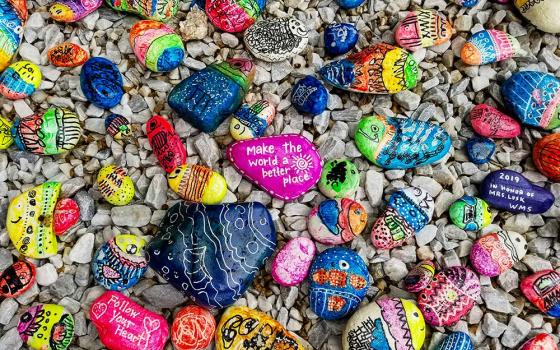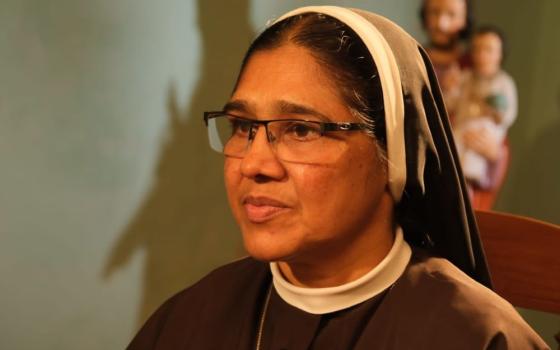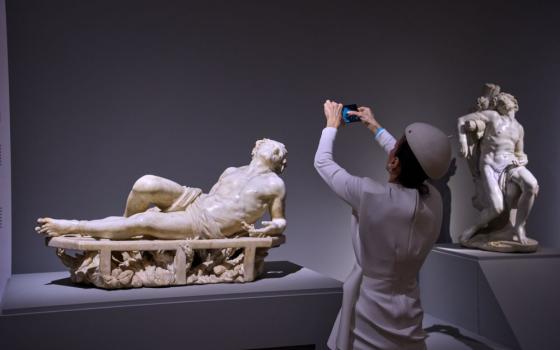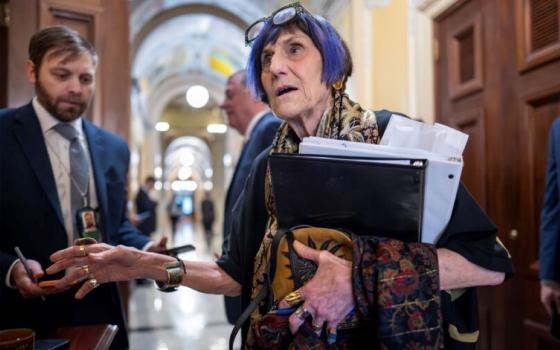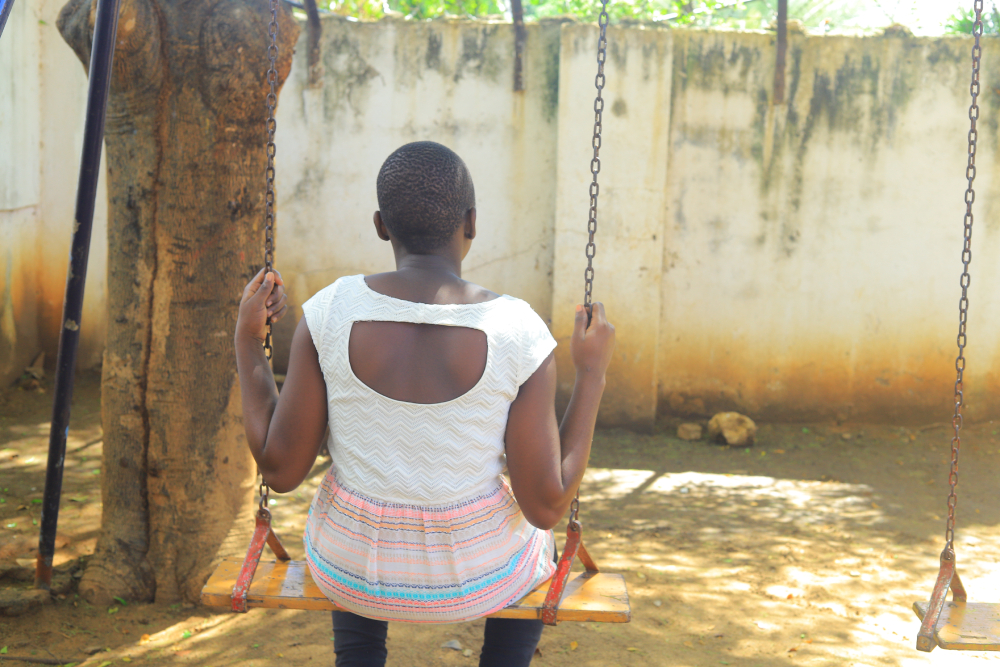
A girl sits alone on a swing at Mahali Pa Usalama, a safe haven run by Catholic sisters for survivors of sexual exploitation. (GSR photo/Doreen Ajiambo)
On the powdery white sands of Mombasa's famous beaches, tourists wander past seaside vendors selling coconuts, beaded necklaces and vivid kanga fabrics. The air is filled with the smell of roasting maize and the sound of the call to prayer floating from a nearby mosque.
But beneath this postcard beauty lies a darker undercurrent. Hidden among the coral-walled towns and behind the ornate doors of Swahili coastal homes, the booming tourism industry has given rise to a sinister companion: child sex tourism.
Quietly battling this hidden crisis, Catholic sisters, educators and elders have made it their mission to protect, heal and empower the region's most vulnerable girls. Armed not with weapons, but with compassion, education and faith, they are working to rescue stolen childhoods and restore shattered futures.
At a gated compound on the outskirts of Mombasa, far from the city's bustling markets and beach bars, the Sisters of Charity of the Good Shepherd run a sanctuary known as Mahali Pa Usalama, or Place of Safety. This is where girls who have escaped abuse and exploitation find refuge, education and a sense of worth.
Sr. Nancy Wanjiru, a soft-spoken but resolute woman in her 40s, starts her day before dawn, quietly checking on the girls who sleep soundly in the safety of the shelter's simple dormitories. Some clutch teddy bears; others curl beneath brightly patterned blankets. All bear invisible wounds.
"These girls have been through horrors that no child should ever know," Wanjiru told Global Sisters Report. "When they come here, they are broken. Our first task is to give them back their dignity."
Mahali Pa Usalama, which belongs to the local archdiocese under Caritas Mombasa, is home to about 30 girls at any given time, though the sisters wish they had room for more. The residents range from 5 to 19 years old, each with a story of betrayal and survival. Many were lured by false promises of work or education. Others were sold or forced into sex work by those they trusted most: their parents, relatives or neighbors.
"We don't just feed them and give them a bed," said Sr. Lucy Ndunge Wambua, who leads the shelter's counseling programs. "We help them heal. We listen to their pain. We remind them that they are children of God, beautiful and loved."
Advertisement
Awino's journey
Before needing the sisters' shelter, Awino, now 25, arrived in Mombasa at 18 with dreams of a brighter future.
Born and raised in a small village in Siaya County in western Kenya, Awino had excelled in high school and dreamed of becoming a nurse. But when her family could not afford college fees, she saw no path forward.
Her chance seemed to come in the form of an old friend who had moved to Mombasa. "She would come home with beautiful clothes and money," Awino recalled. "She told me if I came with her, I could have the same."
But the reality was starkly different. Within weeks, Awino found herself trapped: pushed into sex work, servicing tourists in exchange for shelter and food. "I felt I had no choice. I was too ashamed to go home. I thought I had failed," she said through tears.
Along the coast, where tourism and poverty meet, Awino's story is common.
"This is not just Kenya's problem," director of Trace Kenya Paul Adoch said. "It's a global shame. The predators are not just here. They come from Europe, from Asia, from North America. And too often, they know they can get away with it."
Investigating the scale of the scourge
Global Sisters Report spent two weeks documenting the trade in Mombasa and nearby towns like Mtwapa and Malindi, immersed in the nightlife's beach bars, guesthouses and resorts where rumors of underage exploitation ran rampant.
Interviews with tourists, local brokers and girls engaged in sex work revealed a deeply entrenched, well-organized network that preyed on poverty and thrived on the demand of visiting foreigners. The trade has become part of the tourist economy: Hotel staff, tour operators and even some local officials are complicit, turning a blind eye or accepting bribes to keep the trade hidden.
In one beachfront bar in Mtwapa, two middle-aged European tourists shared with GSR over drinks why they returned to Mombasa so often.
"You can get whatever you want here," said the German tourist with a grin. "No one checks. The beach boys know where to find young girls if that's what you're after. No one cares — they just want your money."
At another guesthouse popular with budget travelers, a retired Swiss tourist bragged about having relationships with "several local girls, all under 18." He boasted that he paid their families in exchange for time with them, describing it as "helping the poor."
On the beach, 14-year-old Asha sells beaded necklaces to tourists — adding that beads weren't the only thing she was expected to offer. "Some men want me, not the beads," she whispered. "I don't like it, but when I go with them, I can buy food for my mother and younger brother."
Fatuma, 15, who had been in the trade for over two years, flatly told GSR that if she says no, "they'll find another girl." She added, "I feel like I don't exist to them — just my body."
Local intermediaries, known as beach boys or fixers, confirmed the ease of arranging such encounters. "We know what the tourists want," one said. "Some come just for this. We make it easy."
Paul Mbunza, vice chairman of Jomo Kenyatta Public Beach, also known as Pirates Beach, shared his concerns that the practice has become so widespread, people no longer discuss it. "This vice has been normalized, and many support it without realizing the harm it causes to our girls," he said. "Most tourists come here with the sole aim of seeking sex with these young girls. They believe they are here just to have fun."
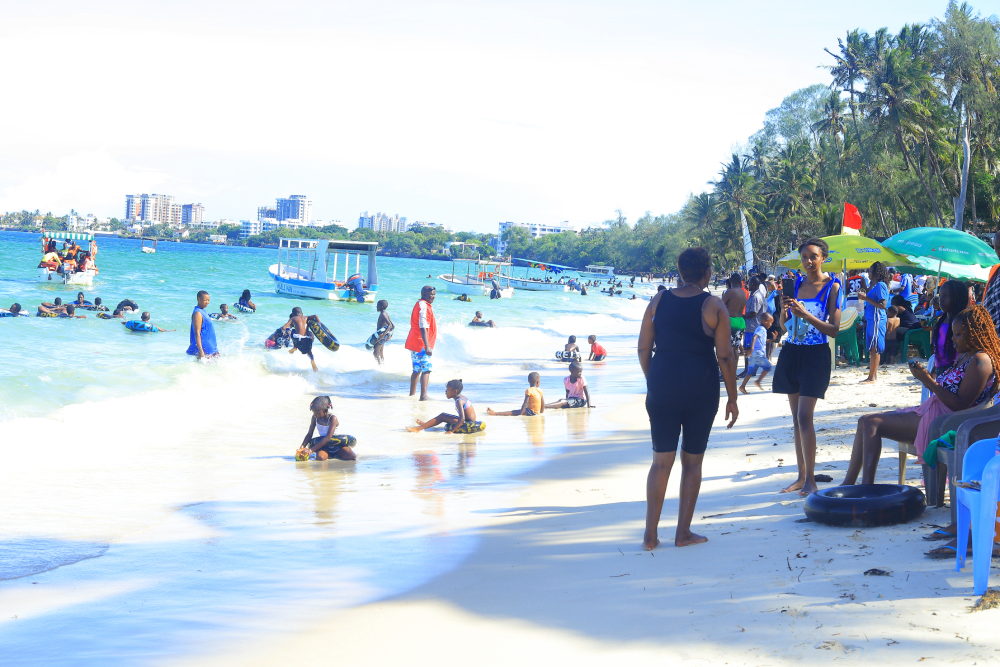
People enjoy the sun and surf at Pirates Beach in Mombasa. (GSR photo/Doreen Ajiambo)
A crisis fueled by culture
Because tourists come with dollars, "people see that as 'opportunity,'" Mbunza said. "But it's not 'opportunity.' It's exploitation — pure and simple. The community ends up paying the price while the criminals walk away richer."
Cultural practices, too, contribute to the problem: In some communities, girls are still viewed as financial assets, as well as acceptable sexual partners for older men, especially when money is involved.
"Child marriage is still common in some communities along the coast," Wanjiru said. "Girls as young as 10 are given to older men, sometimes in exchange for money that desperate families see as survival."
Reports by Trace Kenya and other NGO advocacy organizations estimate that thousands of girls are exploited along the coastal region every year, with many cases going unreported due to stigma, fear, or community pressure.
Weak law enforcement allows most perpetrators, especially foreigners, to escape justice, said Paul Adoch, director of Trace Kenya. While some countries have laws permitting the prosecution of their nationals for child sex crimes committed abroad, enforcement of these laws is rare and often hindered by bureaucracy or lack of political will.
"This is not just Kenya's problem," Adoch said. "It's a global shame. The predators are not just here. They come from Europe, from Asia, from North America. And too often, they know they can get away with it."
Healing in the 'Place of Safety'
Wanjiru said their sister-run shelter takes in girls who have been abused, trafficked, abandoned — sometimes all three.
"Our role is to protect them, give them shelter, food, education, and help them heal so they can dream again."
At Mahali Pa Usalama, the team provides refuge for girls between the ages of 5 and 19. Most stay for up to a year, though some remain longer when their situations are too dangerous or unstable for them to return home.
"We try to reunite them with family if it's safe," Wanjiru said. "But too often, it isn't. If not, we help them find schools, vocational training and a path forward. They deserve a future."
Legal advocacy is also central to their work, even if the path to justice is filled with obstacles. "We help them take their cases to court," she said. "But justice is slow. Sometimes families don't want the girls back. They see them as damaged or as troublemakers for reporting abuse. It breaks your heart."
Wambua, who offers counseling at Mahali Pa Usalama, described the fragile state of many of the girls when they first arrive. "When a girl comes to us, she's often very withdrawn, very traumatized," she said. "I start by telling her she's beautiful, that she's a child of God, worthy of love."
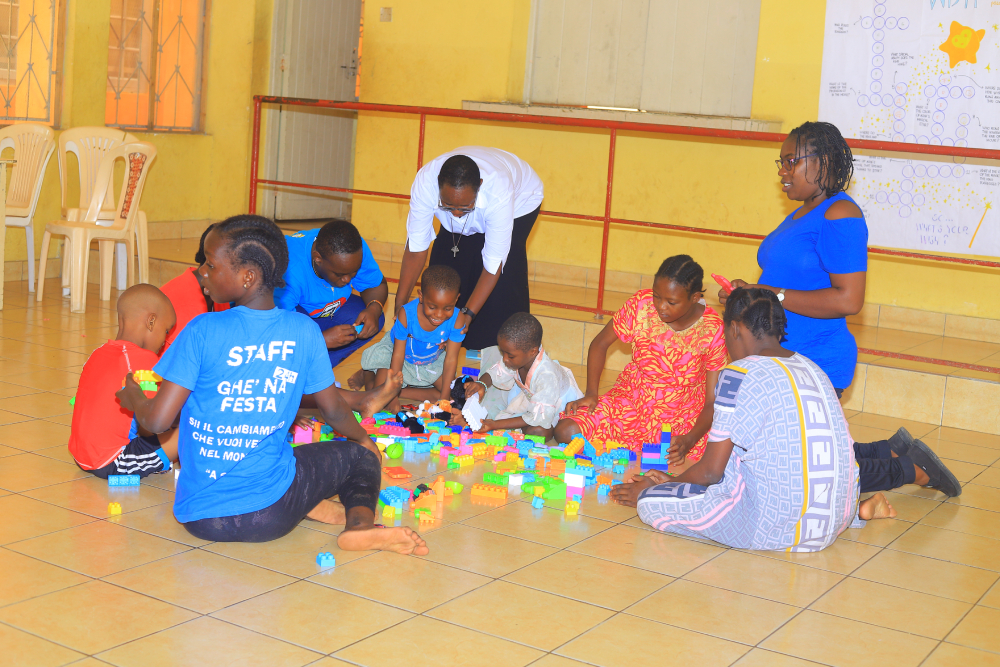
Children gather on the tiled floor for a group building activity led by caregivers and sisters. Taken on April 24, 2025, the scene reflects Mahali Pa Usalama’s mission to rebuild broken childhoods through compassion and community. (GSR photo/Doreen Ajiambo)
Building trust can take weeks, sometimes months. "We listen. We let them tell their stories at their own pace. Healing doesn't happen overnight. But we walk with them, every step."
The girls are enrolled in school or vocational classes, learning skills like tailoring, hairdressing, and even mechanics. "Education is the key," Wambua emphasized. "Without it, the cycle of exploitation just keeps turning."
Adoch, whose organization Trace Kenya also rescues girls from beaches, hotels, and guesthouses along the coast, echoed the sisters' mission. "Our work doesn't stop at pulling them out of danger," he said. "We help them find shelter, counseling, education, legal support — whatever it takes to give them a second chance."
He shared how difficult it can be to keep up with the demand for help. "Every week we get calls — police officers, hotel workers, sometimes even other children alerting us about a girl in trouble. We rush in, but it's like trying to stop a flood with a bucket."
Adoch also spoke about the emotional toll. "You look into the eyes of a 12-year-old who has been sold again and again, and she asks you if it's over now. And you want to say yes, but in your heart, you know the danger is never far."
"But we do what we can," he added. "These girls deserve safety, dignity, hope. And I believe we owe it to them to fight for that."
The sisters work closely with local leaders, chiefs, and faith groups to raise awareness and change attitudes. They organize workshops in villages, teaching parents about children's rights and the dangers of exploitation.
"We believe education is the most powerful weapon against this evil," Wanjiru said. "If a girl is in school, she is safer. If a family understands the value of their daughter, they will protect her."
Meanwhile, as the sun dips below the horizon, casting long shadows over Mombasa's streets, the sisters prepare for another night's work: fielding calls from police about rescued girls, comforting a new arrival, planning tomorrow's lessons. Their mission is far from over.
"We may not change the whole world," Wambua said, "but we can change the world for these girls. And that is everything."
Advertisement


